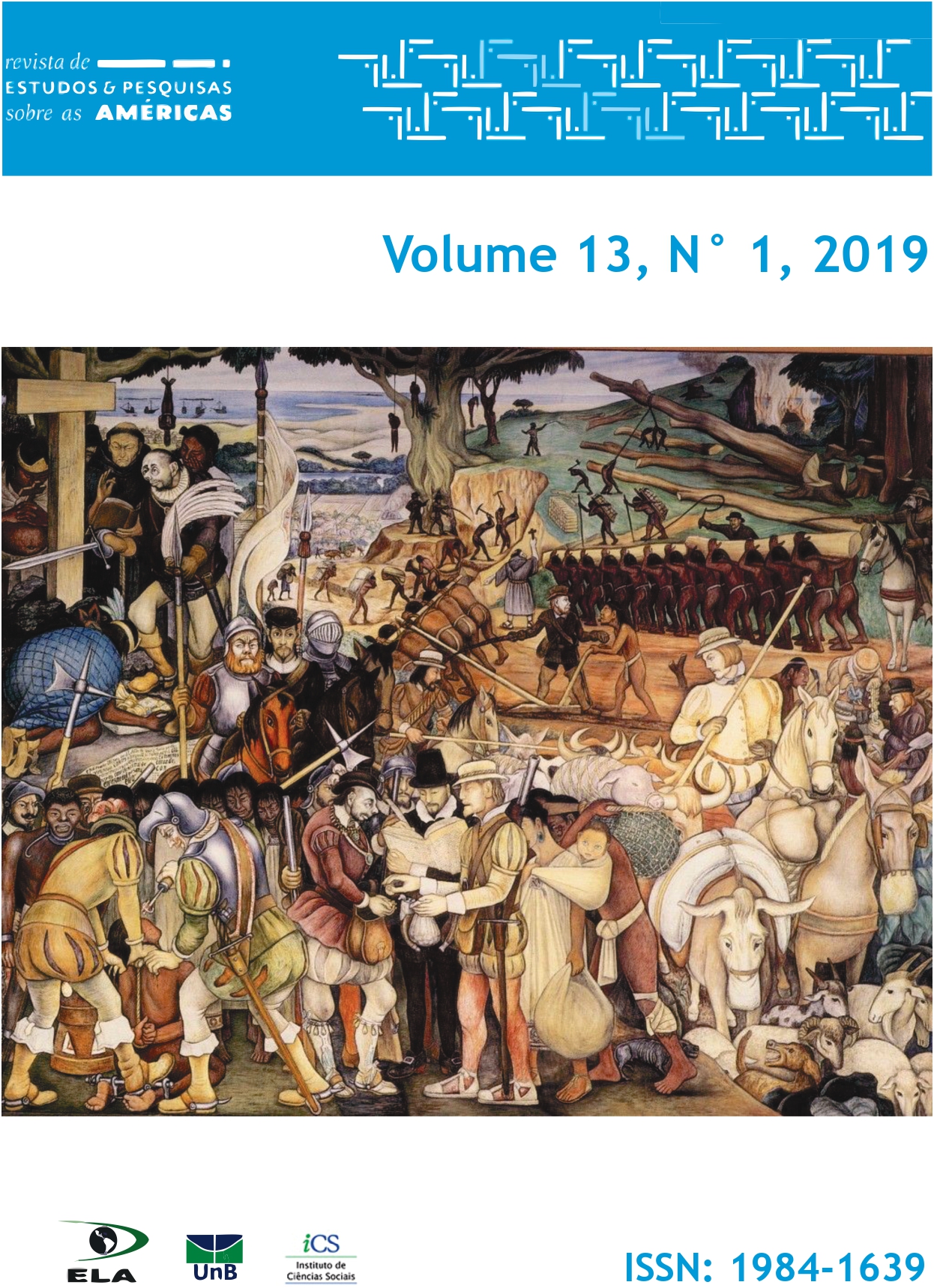Education and Immigration: the importance of the teaching of Sociology for immigrants
DOI:
https://doi.org/10.21057/10.21057/repamv13n1.2019.24298Keywords:
International Migration, sociology teaching, children studentsAbstract
This paper approaches in a reflective way the relationship between migration and education. It aims to make a call for more studies on the importance of teaching sociology in schools with immigrant students. The number of immigrants in Brazil has increased in the last two decades. Consequently, it has also increased the number of immigrant children and adolescents into the basic educational system. Therefore, it is necessary to think how sociology with its conceptual, pedagogical and methodological instruments can be a locus for the immigrant and non-migrant students to understand better the particularities of migratory processes, their motivations and consequences. In addition, it is important to think about how the discipline of sociology can contribute to the processes of socio-cultural integration and socialization of immigrant students in their new cultural context. In addition, it is necessary to understand further about how sociology can collaborate for the schools to value the differences and cultural peculiarities of the immigrants.
Downloads
References
BOURDIEU, P; PASSERON, J. Os Herdeiros: os estudantes e a cultura. Florianópolis: Editora da UFSC, 2014.
CAVALCANTI, L; TONHATI, T.; DUTRA, D.; OLIVEIRA, M (Org.). A imigração haitiana no Brasil: características sócio-demográficas e laborais na região sul e no Distrito Federal. 1. ed. Santiago: Universidad de Desarrollo (UDD), 2016. v. 1. p.149.
FIORELLI, I. L. (2010) Capítulo 1. O ensino das Ciências Sociais/Sociologia no Brasil: histórico e perspectivas. In: Sociologia: ensino médio / Coordenação Amaury César Moraes. Brasília: Ministério da Educação, Secretaria de Educação Básica, 2010, p. 15-45. (Coleção Explorando o Ensino; v. 15)
FIORELLI, I. L. (2014), A sociologia de volta à escola: um balanço provisório. Revista de Ciências Sociais, Fortaleza, v. 45, n. 1, 2014, p. 277-284.
HANDERSON, J. Diáspora. As dinâmicas da mobilidade haitiana no Brasil, no Suriname e na Guiana Francesa. Tese de doutorado. Rio de Janeiro: UFRJ/Museu Nacional, 2015.
LAHIRE, B. Viver e interpretar o mundo social: para que serve o ensino da Sociologia? Revista de Ciências Sociais, Fortaleza, v. 45, n. 1, jan/jun, 2014, p. 45-61
LAI AMÂNDIO, S. O fio constitutivo da sociologia empírica de Bernard Lahire , Sociologia, Problemas e Práticas [Online], 76 | 2014, posto online no dia 04 novembro 2014, consultado no dia 04 abril 2019. URL : http://journals.openedition.org/spp/1669
LEAL, S. (2017). Dispositivos de normatização do ensino de sociologia na escola: formação e saberes docentes de licenciandos em ciências sociais no distrito federal Educ. Soc., Campinas, v. 38, nº. 141, p.1075-1099, out.-dez., 2017.
LEAL, S. e YUNG, T. Por uma sociologia do ensino de sociologia nas escolas: da finalidade atribuída à disciplina à experiência social do alunato. Estudos de caso no Distrito Federal. Revista Sociedade e Estado - Volume 30 Número 3 Setembro/Dezembro 2015, p. 773-796.
MEUCCI, S. A institucionalização da sociologia no Brasil: os primeiros manuais e cursos [1900-1948]. 2000. Dissertação (Mestrado em Sociologia) ”“ IFCHUnicamp,
MILLS, C. Wright. The Sociological Imagination (Oxford: Oxford University Press, 1959)
MORAES, A. C. Licenciatura em Ciências Sociais e Sociologia. Tempo Social, São Paulo, v. 15, n. 1, p. 5-20, maio 2003.
OLIVEIRA, T. (2018). Movimentação e registro de migrantes no Brasil: dados do STI e SINCRE. In: Cavalcanti, L; Oliveira, T.; Macedo, M., Migrações e Mercado de Trabalho no Brasil. Relatório Anual 2018. Série Migrações. Observatório das Migrações Internacionais; Ministério do Trabalho/ Conselho Nacional de Imigração e Coordenação Geral de Imigração. Brasília, DF: OBMigra, 2018, p. 55-75.
SILVA, S. Fronteira amazônica: passagem obrigatória para haitianos? REMHU - Rev. Interdiscip. Mobil. Hum., Brasília, Ano XXIII, n. 44, p. 119-134, jan./jun. 2015.
SIMÕES, G. Perfil sociodemográfico e laboral da imigração venezuelana no Brasil (Org). Curitiba: CRV, 2017.
TONHATI, T.; CAVALCANTI, L. ; OLIVEIRA, A. T. . Os Imigrantes Haitianos no Brasil: Formas de Entrada, Permanência e Registros. In: CAVALCANTI, L; TONHATI, T.; DUTRA, D.; OLIVEIRA, M (Org.). A imigração haitiana no Brasil: características sócio-demográficas e laborais na região sul e no Distrito Federal. 1ed.Santiago: OIM/Universidad de Desarrollo (UDD), 2016, v. 1, p. 24-40.
TONHATI, T. The transnational family: migration, family and rituals among Brazilian migrant women in the UK. Tese de doutorado. Goldsmiths, University of London, 2017, p. 314.
WERNECK VIANNA, et al. As Ciências Sociais no Brasil: a formação de um sistema nacional de ensino e pesquisa. BIB: Boletim Informativo e Bibliográfico de Ciências Sociais, Rio de Janeiro, n. 40, p. 27-63, 1995.
Ӣ Education and Immigration: The Importance of Teaching Sociology to Immigrants
”¢ Educación e Inmigración: la importancia de la enseñanza de la sociología para los inmigrantes
Downloads
Published
How to Cite
Issue
Section
License
The published material is the property of the Journal, and may be reproduced in whole or in part with indication of the source.
Copyright: Authors will be responsible for obtaining the copyright of the material used. Authors who publish in this journal agree to the following terms:
a)Authors retain the copyright and grant the journal the right of first publication, with the work simultaneously licensed under
the Creative Commons Attribution License which allows the sharing of work with acknowledgment of authorship and initial publication in this journal.
b) Authors are authorized to take additional contracts separately, for non-exclusive distribution of the version of the work published in this journal (eg, publish in institutional repository or as a book chapter), with acknowledgment of authorship and initial publication in this journal.
c) Authors are allowed and encouraged to publish and distribute their work online (eg in institutional repositories or on their personal page) at any point before or during the editorial process, as this can generate productive changes as well as increase the impact and the citation of the published work (See The Effect of Free Access).
















